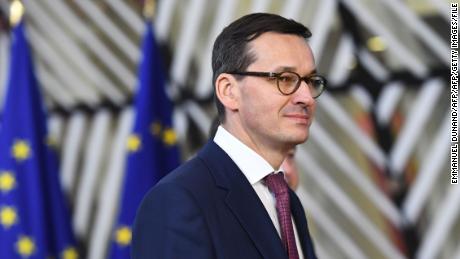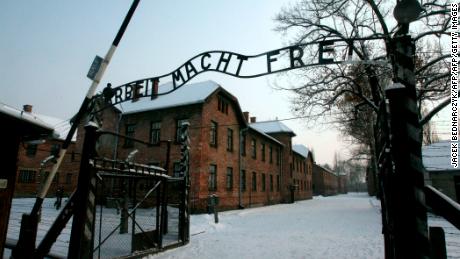Profanities were scrawled across a noticeboard outside the embassy and a swastika had been drawn on the entrance gate. Israeli police have opened an investigation into the incident.Tensions between the two countries have ratcheted up since Poland passed a controversial new Holocaust-related bill earlier this month.The law, which, which makes it illegal to accuse the Polish nation of complicity in crimes committed by Nazi Germany, including the Holocaust, also bans the use of terms such as "Polish death camps" in relation to Auschwitz and other such camps located in Nazi-occupied Poland. Violations would be punished by a fine or a jail sentence of up to three years.Israel has been vociferous in its criticism of the new law, accusing Poland of attempting to rewrite history.But Morawiecki's comments on Saturday at a security conference in Munich prompted a fresh wave of anger.Replying to an Israeli journalist when questioned about whether a person could be imprisoned for claiming there were Polish collaborators in the Holocaust, Reuters reported Morawiecki as saying, "Of course it's not going to be punishable, not going to be seen as criminal, to say that there were Polish perpetrators, as there were Jewish perpetrators, as there were Russian perpetrators, as there were Ukrainian, not only German perpetrators." The comments sparked an outcry from Israeli leaders, including Prime Minister Benjamin Netanyahu, who phoned Morawiecki to register his disgust.Netanyahu labeled the comments as "unacceptable" and insisted "there was no basis for comparing the actions of Poles during the Holocaust to those of Jews." Netanyahu added that the "distortion regarding Poland could not be corrected by means of another distortion."Israeli President Reuben Rivlin described Morawiecki's remarks as a "new low."Read: Poland's Holocaust law should terrify youA Polish government spokesperson sought to clarity Morawiecki's comments, insisting they were not "intended to deny the Holocaust, or charge the Jewish victims of the Holocaust with responsibility for what was a Nazi German perpetrated genocide.""The Prime Minister has repeatedly and categorically opposed denial of the Holocaust — the murder of European Jewry — as well as anti-Semitism in all its forms," the spokesperson said in a statement."Attempts to equate the crimes of Nazi German perpetrators with the actions of their victims — Jewish, Polish, Romani among others — who struggled for survival should be met with resolute, outright condemnation."Poland was the center of Ashkenazi Jewry before the Holocaust, with around 3.5 million Jews living in the country before the outbreak of World War II in 1939. By the end of the war, just 10% of the community remained. Six million Jews were killed in the Holocaust overall.
The comments sparked an outcry from Israeli leaders, including Prime Minister Benjamin Netanyahu, who phoned Morawiecki to register his disgust.Netanyahu labeled the comments as "unacceptable" and insisted "there was no basis for comparing the actions of Poles during the Holocaust to those of Jews." Netanyahu added that the "distortion regarding Poland could not be corrected by means of another distortion."Israeli President Reuben Rivlin described Morawiecki's remarks as a "new low."Read: Poland's Holocaust law should terrify youA Polish government spokesperson sought to clarity Morawiecki's comments, insisting they were not "intended to deny the Holocaust, or charge the Jewish victims of the Holocaust with responsibility for what was a Nazi German perpetrated genocide.""The Prime Minister has repeatedly and categorically opposed denial of the Holocaust — the murder of European Jewry — as well as anti-Semitism in all its forms," the spokesperson said in a statement."Attempts to equate the crimes of Nazi German perpetrators with the actions of their victims — Jewish, Polish, Romani among others — who struggled for survival should be met with resolute, outright condemnation."Poland was the center of Ashkenazi Jewry before the Holocaust, with around 3.5 million Jews living in the country before the outbreak of World War II in 1939. By the end of the war, just 10% of the community remained. Six million Jews were killed in the Holocaust overall. According to Yad Vashem, the World Holocaust Remembrance Center in Jerusalem, between 30,000 and 35,000 Polish Jews were saved with the help of non-Jewish Polish citizens.Despite more Poles being honored as Righteous Among the Nations — non-Jews who helped Jews during the Holocaust — than any other country, there is a consensus among historians that certain Polish individuals and groups did collaborate with the Nazi occupiers. Recent Polish governments have sought to challenge that narrative.Earlier this month, Poland's deputy foreign minister Bartosz Cichocki told CNN that the new law was "not meant to revise the history whatsoever, this is meant to guard the truth about the Holocaust.""We have to realize that when he or she says that the Polish state or the Polish nation is responsible for the Holocaust, they diminish the responsibility of the real perpetrators," Cichocki added.
According to Yad Vashem, the World Holocaust Remembrance Center in Jerusalem, between 30,000 and 35,000 Polish Jews were saved with the help of non-Jewish Polish citizens.Despite more Poles being honored as Righteous Among the Nations — non-Jews who helped Jews during the Holocaust — than any other country, there is a consensus among historians that certain Polish individuals and groups did collaborate with the Nazi occupiers. Recent Polish governments have sought to challenge that narrative.Earlier this month, Poland's deputy foreign minister Bartosz Cichocki told CNN that the new law was "not meant to revise the history whatsoever, this is meant to guard the truth about the Holocaust.""We have to realize that when he or she says that the Polish state or the Polish nation is responsible for the Holocaust, they diminish the responsibility of the real perpetrators," Cichocki added.
CNN's Oren Liebermann reported from Jerusalem. James Masters wrote from London.
Original Article
[contf] [contfnew] 
CNN
[contfnewc] [contfnewc]






